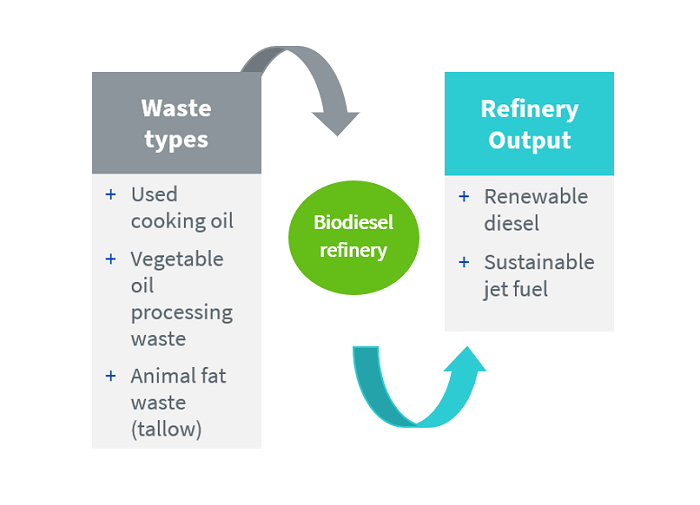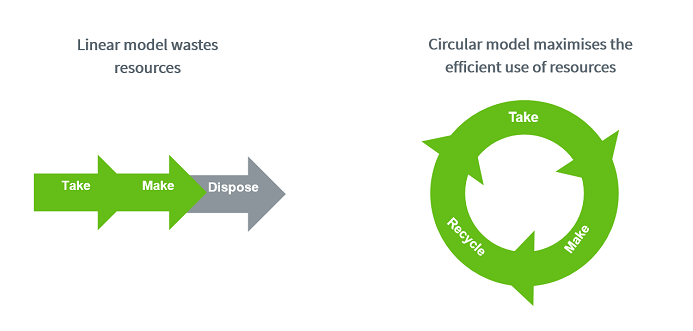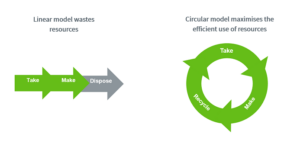On 16 November 2022, UK’s Royal Air Force (RAF) Voyager aircraft, the military variant of the Airbus A330, took to the skies for 90 minutes over Oxfordshire. What looked like a routine test flight in its outward appearance was ultimately deemed ground-breaking. Why? It was a world-first military transporter aircraft flight, and the first of any aircraft type in the UK to be completed using 100% sustainable jet fuel.
What are renewable fuels?
Renewable hydrocarbon biofuels (also called green or drop-in biofuels) are fuels produced from biomass sources through a variety of biological, thermal, and chemical processes. These products are chemically identical to petroleum gasoline, diesel, or jet fuel1.
In other words, renewable fuels are sources of energy chemically identical to fossil fuels but produced from domestic, commercial, or agricultural waste (see Figure 1 below).
Figure 1: Converting waste into energy


Why the excitement?
Renewable fuels, like renewable diesel and sustainable jet fuel, can reduce greenhouse gas emissions by around 80-90% compared to fossil fuels2. And because they burn much cleaner, engine filters remain cleaner for longer reducing the need for maintenance. Furthermore, given used cooking oil, vegetable oil, processing waste, and animal fat waste are used as inputs, the production of these fuels reduces biowaste, thereby cutting emissions from landfills.
This makes renewable fuels a key component of the circular economy. Humans have largely operated on the linear model historically when it comes to utilising natural resources. The circular model, in contrast, is much less wasteful and seeks to recycle as much as possible (see Figure 2 below).
Figure 2: The Circular Economy


Source: WisdomTree, Ellen MacArthur Foundation, 2023.
The most exciting thing about renewable fuels is the immediacy with which they can make an impact. The reason why they are referred to as drop-in fuels is that they can replace fossil fuels in internal combustion engines with little or no modification required. So, if supply was abundant enough, forms of transport which cannot be electrified easily like heavy duty trucks, ships, and aeroplanes can be switched across to renewable fuels making a significant improvement to the environmental footprint. According to BP, “A return flight between London and San Francisco has a carbon footprint per economy ticket of nearly 1 tonne of CO2 equivalent. With the aviation industry expected to double to over 8 billion passengers by 2050, it is essential that we act to reduce aviation’s carbon emissions.”
The challenge
Renewable fuels or biofuels are still in their infancy. This means the obvious hurdle to overcome is cost competitiveness with fossil fuels. Cost estimates vary, but figures from the International Air Transport Association (IATA) provide a useful sense for the ballpark. In May 2022, IATA stated that the average worldwide price of jet fuel is about $4.15 per gallon compared to the US average price of a gallon of sustainable aviation fuel, which is about $8.67.
So, roughly double the price of the incumbent polluting technology. This is not a bad starting point at all. Considering how rapidly the cost of energy storage in batteries has fallen in the last decade, renewable fuels could become competitive quite soon if sufficient investment is made and economies of scale are achieved. IATA also predicts that renewable fuels could make up 2% of all aviation fuels by 2025, which could become a tipping point in their competitiveness.
Businesses are acting
Businesses pursuing their own net zero targets have already started exploring renewable fuels to minimise their waste. Darling Ingredients Inc, which produces its trademark Diamond Green Diesel from recycled animal fats, inedible corn oil, and used cooking oil, was chosen by fast food chain Chick-fil-A in March 2022 to turn its used cooking oil into clean transportation fuel.
Similarly, McDonald’s entered into a partnership with Neste Corporation in 2020 to convert its used vegetable oil into renewable diesel and fuel the trucks that make deliveries to its restaurants. According to TortoiseEcofin, both Darling Ingredients and Neste have a net negative carbon footprint given emissions produced by these businesses are lower that the emissions avoided because of their renewable fuels3.
A final word
Renewable fuels alone will not tackle climate change. No single solution can. But they can help us make meaningful progress. The Intergovernmental Panel on Climate Change (IPCC) emphasises how crucial it is for the world to halve its greenhouse gas emissions this decade to at least have a chance of limiting global warming to 1.5oC. This means that solutions with an immediate effect have an important role to play. Biofuels can cut emissions from waste in landfills and provide much cleaner alternatives to fossil fuels to help accelerate the world’s decarbonisation efforts. They don’t require different engines to be of use. They just need funding to reach scale.
Sources
1 According to the US Department of Energy.
2 According to Neste, January 2023.
3 Based on scope 1 and scope 2 emissions. Scope 1 covers direct emissions from owned or controlled sources. Scope 2 covers indirect emissions from the generation of purchased electricity, steam, heating, and cooling consumed by the reporting company.
—
Originally Posted February 8, 2023 – How renewable fuels are accelerating the decarbonisation of transport
Disclosure: WisdomTree Europe
This material is prepared by WisdomTree and its affiliates and is not intended to be relied upon as a forecast, research or investment advice, and is not a recommendation, offer or solicitation to buy or sell any securities or to adopt any investment strategy. The opinions expressed are as of the date of production and may change as subsequent conditions vary. The information and opinions contained in this material are derived from proprietary and non-proprietary sources. As such, no warranty of accuracy or reliability is given and no responsibility arising in any other way for errors and omissions (including responsibility to any person by reason of negligence) is accepted by WisdomTree, nor any affiliate, nor any of their officers, employees or agents. Reliance upon information in this material is at the sole discretion of the reader. Past performance is not a reliable indicator of future performance.
Please click here for our full disclaimer.
Jurisdictions in the European Economic Area (“EEA”): This content has been provided by WisdomTree Ireland Limited, which is authorised and regulated by the Central Bank of Ireland.
Jurisdictions outside of the EEA: This content has been provided by WisdomTree UK Limited, which is authorised and regulated by the United Kingdom Financial Conduct Authority.
Disclosure: Interactive Brokers
Information posted on IBKR Campus that is provided by third-parties does NOT constitute a recommendation that you should contract for the services of that third party. Third-party participants who contribute to IBKR Campus are independent of Interactive Brokers and Interactive Brokers does not make any representations or warranties concerning the services offered, their past or future performance, or the accuracy of the information provided by the third party. Past performance is no guarantee of future results.
This material is from WisdomTree Europe and is being posted with its permission. The views expressed in this material are solely those of the author and/or WisdomTree Europe and Interactive Brokers is not endorsing or recommending any investment or trading discussed in the material. This material is not and should not be construed as an offer to buy or sell any security. It should not be construed as research or investment advice or a recommendation to buy, sell or hold any security or commodity. This material does not and is not intended to take into account the particular financial conditions, investment objectives or requirements of individual customers. Before acting on this material, you should consider whether it is suitable for your particular circumstances and, as necessary, seek professional advice.
Disclosure: ETFs
Any discussion or mention of an ETF is not to be construed as recommendation, promotion or solicitation. All investors should review and consider associated investment risks, charges and expenses of the investment company or fund prior to investing. Before acting on this material, you should consider whether it is suitable for your particular circumstances and, as necessary, seek professional advice.
Disclosure: Futures Trading
Futures are not suitable for all investors. The amount you may lose may be greater than your initial investment. Before trading futures, please read the CFTC Risk Disclosure. A copy and additional information are available at ibkr.com.

























